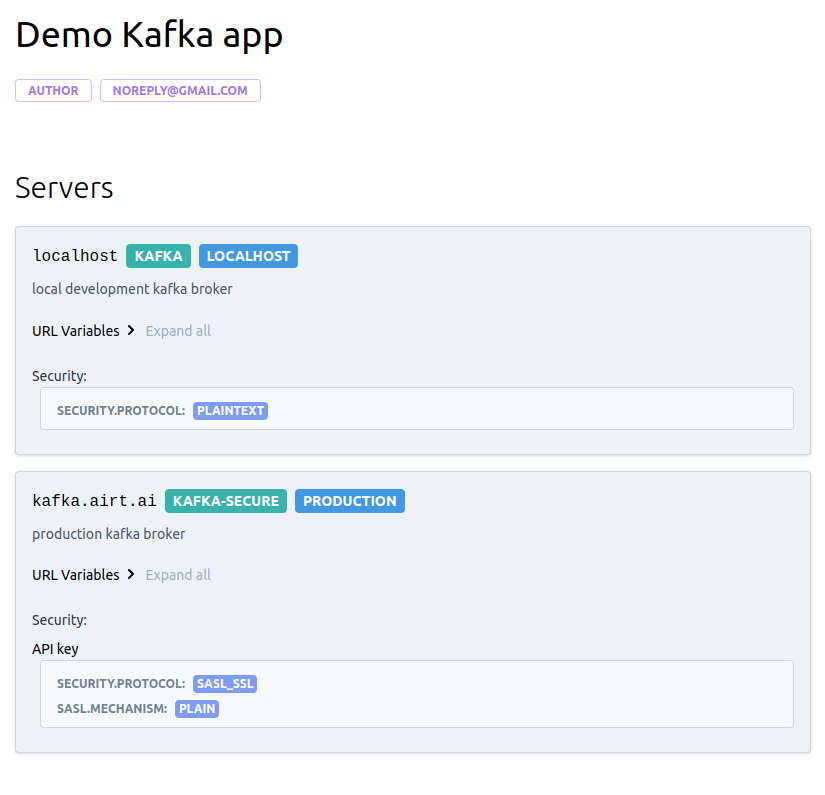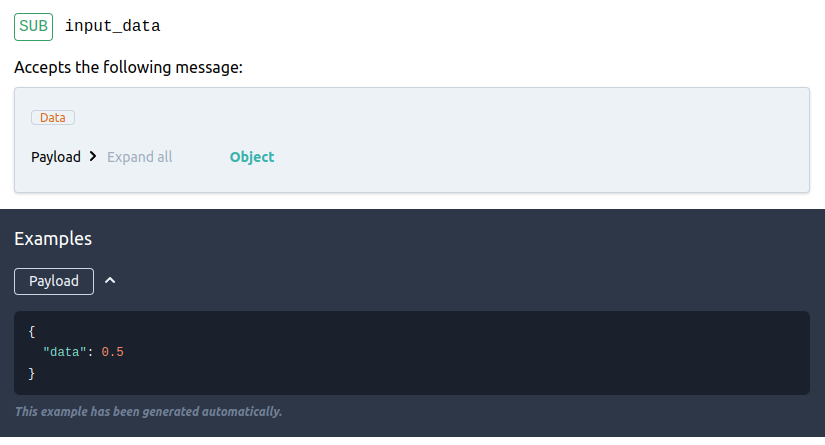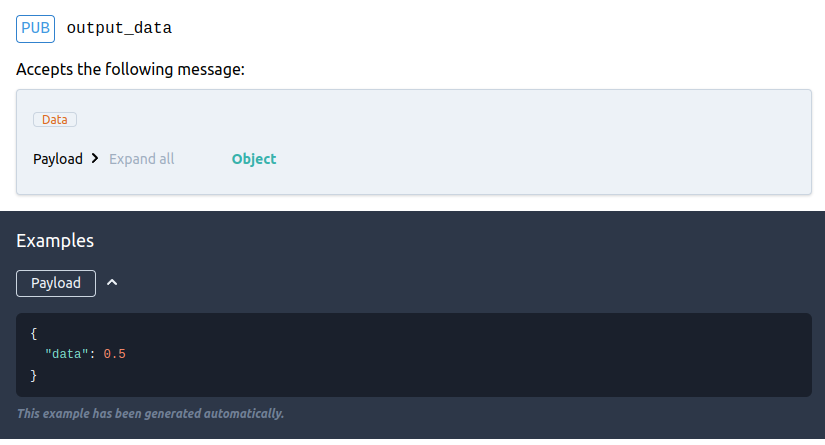Awesome
FastKafka
<!-- WARNING: THIS FILE WAS AUTOGENERATED! DO NOT EDIT! --><b>Effortless Kafka integration for your web services</b>
Deprecation notice
This project is superceeded by FastStream.
FastStream is a new package based on the ideas and experiences gained from FastKafka and Propan. By joining our forces, we picked up the best from both packages and created the unified way to write services capable of processing streamed data regradless of the underliying protocol.
We’ll continue to maintain FastKafka package, but new development will be in FastStream. If you are starting a new service, FastStream is the recommended way to do it.





FastKafka is a powerful and easy-to-use Python library for building asynchronous services that interact with Kafka topics. Built on top of Pydantic, AIOKafka and AsyncAPI, FastKafka simplifies the process of writing producers and consumers for Kafka topics, handling all the parsing, networking, task scheduling and data generation automatically. With FastKafka, you can quickly prototype and develop high-performance Kafka-based services with minimal code, making it an ideal choice for developers looking to streamline their workflow and accelerate their projects.
⭐⭐⭐ Stay in touch ⭐⭐⭐
Please show your support and stay in touch by:
-
giving our GitHub repository a star, and
-
joining our Discord server.
Your support helps us to stay in touch with you and encourages us to continue developing and improving the library. Thank you for your support!
🐝🐝🐝 We were busy lately 🐝🐝🐝
Install
FastKafka works on Windows, macOS, Linux, and most Unix-style operating
systems. You can install base version of FastKafka with pip as usual:
pip install fastkafka
To install FastKafka with testing features please use:
pip install fastkafka[test]
To install FastKafka with asyncapi docs please use:
pip install fastkafka[docs]
To install FastKafka with all the features please use:
pip install fastkafka[test,docs]
Tutorial
You can start an interactive tutorial in Google Colab by clicking the button below:
<a href="https://colab.research.google.com/github/airtai/fastkafka/blob/main/nbs/index.ipynb" target=”_blank”> <img src="https://colab.research.google.com/assets/colab-badge.svg" alt="Open in Colab" /> </a>Writing server code
To demonstrate FastKafka simplicity of using @produces and @consumes
decorators, we will focus on a simple app.
The app will consume JSON messages containing positive floats from one topic, log them, and then produce incremented values to another topic.
Messages
FastKafka uses Pydantic to parse input
JSON-encoded data into Python objects, making it easy to work with
structured data in your Kafka-based applications. Pydantic’s
BaseModel class allows you
to define messages using a declarative syntax, making it easy to specify
the fields and types of your messages.
This example defines one Data mesage class. This Class will model the
consumed and produced data in our app demo, it contains one
NonNegativeFloat field data that will be logged and “processed”
before being produced to another topic.
These message class will be used to parse and validate incoming data in Kafka consumers and producers.
from pydantic import BaseModel, Field, NonNegativeFloat
class Data(BaseModel):
data: NonNegativeFloat = Field(
..., example=0.5, description="Float data example"
)
Application
This example shows how to initialize a FastKafka application.
It starts by defining a dictionary called kafka_brokers, which
contains two entries: "localhost" and "production", specifying local
development and production Kafka brokers. Each entry specifies the URL,
port, and other details of a Kafka broker. This dictionary is used for
both generating the documentation and later to run the actual server
against one of the given kafka broker.
Next, an object of the
FastKafka
class is initialized with the minimum set of arguments:
kafka_brokers: a dictionary used for generation of documentation
We will also import and create a logger so that we can log the incoming data in our consuming function.
from logging import getLogger
from fastkafka import FastKafka
logger = getLogger("Demo Kafka app")
kafka_brokers = {
"localhost": {
"url": "localhost",
"description": "local development kafka broker",
"port": 9092,
},
"production": {
"url": "kafka.airt.ai",
"description": "production kafka broker",
"port": 9092,
"protocol": "kafka-secure",
"security": {"type": "plain"},
},
}
kafka_app = FastKafka(
title="Demo Kafka app",
kafka_brokers=kafka_brokers,
)
Function decorators
FastKafka provides convenient function decorators @kafka_app.consumes
and @kafka_app.produces to allow you to delegate the actual process of
-
consuming and producing data to Kafka, and
-
decoding and encoding JSON messages
from user defined functions to the framework. The FastKafka framework delegates these jobs to AIOKafka and Pydantic libraries.
These decorators make it easy to specify the processing logic for your Kafka consumers and producers, allowing you to focus on the core business logic of your application without worrying about the underlying Kafka integration.
This following example shows how to use the @kafka_app.consumes and
@kafka_app.produces decorators in a FastKafka application:
-
The
@kafka_app.consumesdecorator is applied to theon_input_datafunction, which specifies that this function should be called whenever a message is received on the “input_data” Kafka topic. Theon_input_datafunction takes a single argument which is expected to be an instance of theDatamessage class. Specifying the type of the single argument is instructing the Pydantic to useData.parse_raw()on the consumed message before passing it to the user defined functionon_input_data. -
The
@producesdecorator is applied to theto_output_datafunction, which specifies that this function should produce a message to the “output_data” Kafka topic whenever it is called. Theto_output_datafunction takes a single float argumentdata. It it increments the data returns it wrapped in aDataobject. The framework will call theData.json().encode("utf-8")function on the returned value and produce it to the specified topic.
@kafka_app.consumes(topic="input_data", auto_offset_reset="latest")
async def on_input_data(msg: Data):
logger.info(f"Got data: {msg.data}")
await to_output_data(msg.data)
@kafka_app.produces(topic="output_data")
async def to_output_data(data: float) -> Data:
processed_data = Data(data=data+1.0)
return processed_data
Testing the service
The service can be tested using the
Tester
instances which internally starts InMemory implementation of Kafka
broker.
The Tester will redirect your consumes and produces decorated functions to the InMemory Kafka broker so that you can quickly test your app without the need for a running Kafka broker and all its dependencies.
from fastkafka.testing import Tester
msg = Data(
data=0.1,
)
# Start Tester app and create InMemory Kafka broker for testing
async with Tester(kafka_app) as tester:
# Send Data message to input_data topic
await tester.to_input_data(msg)
# Assert that the kafka_app responded with incremented data in output_data topic
await tester.awaited_mocks.on_output_data.assert_awaited_with(
Data(data=1.1), timeout=2
)
[INFO] fastkafka._testing.in_memory_broker: InMemoryBroker._start() called
[INFO] fastkafka._testing.in_memory_broker: InMemoryBroker._patch_consumers_and_producers(): Patching consumers and producers!
[INFO] fastkafka._testing.in_memory_broker: InMemoryBroker starting
[INFO] fastkafka._application.app: _create_producer() : created producer using the config: '{'bootstrap_servers': 'localhost:9092'}'
[INFO] fastkafka._testing.in_memory_broker: AIOKafkaProducer patched start() called()
[INFO] fastkafka._application.app: _create_producer() : created producer using the config: '{'bootstrap_servers': 'localhost:9092'}'
[INFO] fastkafka._testing.in_memory_broker: AIOKafkaProducer patched start() called()
[INFO] fastkafka._components.aiokafka_consumer_loop: aiokafka_consumer_loop() starting...
[INFO] fastkafka._components.aiokafka_consumer_loop: aiokafka_consumer_loop(): Consumer created using the following parameters: {'bootstrap_servers': 'localhost:9092', 'auto_offset_reset': 'latest', 'max_poll_records': 100}
[INFO] fastkafka._testing.in_memory_broker: AIOKafkaConsumer patched start() called()
[INFO] fastkafka._components.aiokafka_consumer_loop: aiokafka_consumer_loop(): Consumer started.
[INFO] fastkafka._testing.in_memory_broker: AIOKafkaConsumer patched subscribe() called
[INFO] fastkafka._testing.in_memory_broker: AIOKafkaConsumer.subscribe(), subscribing to: ['input_data']
[INFO] fastkafka._components.aiokafka_consumer_loop: aiokafka_consumer_loop(): Consumer subscribed.
[INFO] fastkafka._components.aiokafka_consumer_loop: aiokafka_consumer_loop() starting...
[INFO] fastkafka._components.aiokafka_consumer_loop: aiokafka_consumer_loop(): Consumer created using the following parameters: {'bootstrap_servers': 'localhost:9092', 'auto_offset_reset': 'earliest', 'max_poll_records': 100}
[INFO] fastkafka._testing.in_memory_broker: AIOKafkaConsumer patched start() called()
[INFO] fastkafka._components.aiokafka_consumer_loop: aiokafka_consumer_loop(): Consumer started.
[INFO] fastkafka._testing.in_memory_broker: AIOKafkaConsumer patched subscribe() called
[INFO] fastkafka._testing.in_memory_broker: AIOKafkaConsumer.subscribe(), subscribing to: ['output_data']
[INFO] fastkafka._components.aiokafka_consumer_loop: aiokafka_consumer_loop(): Consumer subscribed.
[INFO] Demo Kafka app: Got data: 0.1
[INFO] fastkafka._testing.in_memory_broker: AIOKafkaConsumer patched stop() called
[INFO] fastkafka._components.aiokafka_consumer_loop: aiokafka_consumer_loop(): Consumer stopped.
[INFO] fastkafka._components.aiokafka_consumer_loop: aiokafka_consumer_loop() finished.
[INFO] fastkafka._testing.in_memory_broker: AIOKafkaProducer patched stop() called
[INFO] fastkafka._testing.in_memory_broker: AIOKafkaConsumer patched stop() called
[INFO] fastkafka._components.aiokafka_consumer_loop: aiokafka_consumer_loop(): Consumer stopped.
[INFO] fastkafka._components.aiokafka_consumer_loop: aiokafka_consumer_loop() finished.
[INFO] fastkafka._testing.in_memory_broker: AIOKafkaProducer patched stop() called
[INFO] fastkafka._testing.in_memory_broker: InMemoryBroker._stop() called
[INFO] fastkafka._testing.in_memory_broker: InMemoryBroker stopping
Recap
We have created a simple FastKafka application. The app will consume the
Data from the input_data topic, log it and produce the incremented
data to output_data topic.
To test the app we have:
-
Created the app
-
Started our Tester class which mirrors the developed app topics for testing purposes
-
Sent Data message to
input_datatopic -
Asserted and checked that the developed service has reacted to Data message
Running the service
The service can be started using builtin faskafka run CLI command.
Before we can do that, we will concatenate the code snippets from above
and save them in a file "application.py"
# content of the "application.py" file
from pydantic import BaseModel, Field, NonNegativeFloat
from fastkafka import FastKafka
from fastkafka._components.logger import get_logger
logger = get_logger(__name__)
class Data(BaseModel):
data: NonNegativeFloat = Field(
..., example=0.5, description="Float data example"
)
kafka_brokers = {
"localhost": {
"url": "localhost",
"description": "local development kafka broker",
"port": 9092,
},
"production": {
"url": "kafka.airt.ai",
"description": "production kafka broker",
"port": 9092,
"protocol": "kafka-secure",
"security": {"type": "plain"},
},
}
kafka_app = FastKafka(
title="Demo Kafka app",
kafka_brokers=kafka_brokers,
)
@kafka_app.consumes(topic="input_data", auto_offset_reset="latest")
async def on_input_data(msg: Data):
logger.info(f"Got data: {msg.data}")
await to_output_data(msg.data)
@kafka_app.produces(topic="output_data")
async def to_output_data(data: float) -> Data:
processed_data = Data(data=data+1.0)
return processed_data
To run the service, use the FastKafka CLI command and pass the module (in this case, the file where the app implementation is located) and the app simbol to the command.
fastkafka run --num-workers=1 --kafka-broker localhost application:kafka_app
After running the command, you should see the following output in your command line:
[1504]: 23-05-31 11:36:45.874 [INFO] fastkafka._application.app: set_kafka_broker() : Setting bootstrap_servers value to 'localhost:9092'
[1504]: 23-05-31 11:36:45.875 [INFO] fastkafka._application.app: _create_producer() : created producer using the config: '{'bootstrap_servers': 'localhost:9092'}'
[1504]: 23-05-31 11:36:45.937 [INFO] fastkafka._components.aiokafka_consumer_loop: aiokafka_consumer_loop() starting...
[1504]: 23-05-31 11:36:45.937 [INFO] fastkafka._components.aiokafka_consumer_loop: aiokafka_consumer_loop(): Consumer created using the following parameters: {'bootstrap_servers': 'localhost:9092', 'auto_offset_reset': 'latest', 'max_poll_records': 100}
[1504]: 23-05-31 11:36:45.956 [INFO] fastkafka._components.aiokafka_consumer_loop: aiokafka_consumer_loop(): Consumer started.
[1504]: 23-05-31 11:36:45.956 [INFO] aiokafka.consumer.subscription_state: Updating subscribed topics to: frozenset({'input_data'})
[1504]: 23-05-31 11:36:45.956 [INFO] aiokafka.consumer.consumer: Subscribed to topic(s): {'input_data'}
[1504]: 23-05-31 11:36:45.956 [INFO] fastkafka._components.aiokafka_consumer_loop: aiokafka_consumer_loop(): Consumer subscribed.
[1506]: 23-05-31 11:36:45.993 [INFO] fastkafka._application.app: set_kafka_broker() : Setting bootstrap_servers value to 'localhost:9092'
[1506]: 23-05-31 11:36:45.994 [INFO] fastkafka._application.app: _create_producer() : created producer using the config: '{'bootstrap_servers': 'localhost:9092'}'
[1506]: 23-05-31 11:36:46.014 [INFO] fastkafka._components.aiokafka_consumer_loop: aiokafka_consumer_loop() starting...
[1506]: 23-05-31 11:36:46.015 [INFO] fastkafka._components.aiokafka_consumer_loop: aiokafka_consumer_loop(): Consumer created using the following parameters: {'bootstrap_servers': 'localhost:9092', 'auto_offset_reset': 'latest', 'max_poll_records': 100}
[1506]: 23-05-31 11:36:46.040 [INFO] fastkafka._components.aiokafka_consumer_loop: aiokafka_consumer_loop(): Consumer started.
[1506]: 23-05-31 11:36:46.042 [INFO] aiokafka.consumer.subscription_state: Updating subscribed topics to: frozenset({'input_data'})
[1506]: 23-05-31 11:36:46.043 [INFO] aiokafka.consumer.consumer: Subscribed to topic(s): {'input_data'}
[1506]: 23-05-31 11:36:46.043 [INFO] fastkafka._components.aiokafka_consumer_loop: aiokafka_consumer_loop(): Consumer subscribed.
[1506]: 23-05-31 11:36:46.068 [ERROR] aiokafka.cluster: Topic input_data not found in cluster metadata
[1506]: 23-05-31 11:36:46.070 [INFO] aiokafka.consumer.group_coordinator: Metadata for topic has changed from {} to {'input_data': 0}.
[1504]: 23-05-31 11:36:46.131 [WARNING] aiokafka.cluster: Topic input_data is not available during auto-create initialization
[1504]: 23-05-31 11:36:46.132 [INFO] aiokafka.consumer.group_coordinator: Metadata for topic has changed from {} to {'input_data': 0}.
[1506]: 23-05-31 11:37:00.237 [ERROR] aiokafka: Unable connect to node with id 0: [Errno 111] Connect call failed ('172.28.0.12', 9092)
[1506]: 23-05-31 11:37:00.237 [ERROR] aiokafka: Unable to update metadata from [0]
[1504]: 23-05-31 11:37:00.238 [ERROR] aiokafka: Unable connect to node with id 0: [Errno 111] Connect call failed ('172.28.0.12', 9092)
[1504]: 23-05-31 11:37:00.238 [ERROR] aiokafka: Unable to update metadata from [0]
[1506]: 23-05-31 11:37:00.294 [INFO] fastkafka._components.aiokafka_consumer_loop: aiokafka_consumer_loop(): Consumer stopped.
[1506]: 23-05-31 11:37:00.294 [INFO] fastkafka._components.aiokafka_consumer_loop: aiokafka_consumer_loop() finished.
Starting process cleanup, this may take a few seconds...
23-05-31 11:37:00.345 [INFO] fastkafka._server: terminate_asyncio_process(): Terminating the process 1504...
23-05-31 11:37:00.345 [INFO] fastkafka._server: terminate_asyncio_process(): Terminating the process 1506...
[1504]: 23-05-31 11:37:00.347 [INFO] fastkafka._components.aiokafka_consumer_loop: aiokafka_consumer_loop(): Consumer stopped.
[1504]: 23-05-31 11:37:00.347 [INFO] fastkafka._components.aiokafka_consumer_loop: aiokafka_consumer_loop() finished.
23-05-31 11:37:00.607 [INFO] fastkafka._server: terminate_asyncio_process(): Process 1506 was already terminated.
23-05-31 11:37:00.822 [INFO] fastkafka._server: terminate_asyncio_process(): Process 1504 was already terminated.
Documentation
The kafka app comes with builtin documentation generation using AsyncApi HTML generator.
AsyncApi requires Node.js to be installed and we provide the following convenience command line for it:
fastkafka docs install_deps
23-05-31 11:38:24.128 [INFO] fastkafka._components.docs_dependencies: AsyncAPI generator installed
To generate the documentation programatically you just need to call the following command:
fastkafka docs generate application:kafka_app
23-05-31 11:38:25.113 [INFO] fastkafka._components.asyncapi: Old async specifications at '/content/asyncapi/spec/asyncapi.yml' does not exist.
23-05-31 11:38:25.118 [INFO] fastkafka._components.asyncapi: New async specifications generated at: '/content/asyncapi/spec/asyncapi.yml'
23-05-31 11:38:43.455 [INFO] fastkafka._components.asyncapi: Async docs generated at 'asyncapi/docs'
23-05-31 11:38:43.455 [INFO] fastkafka._components.asyncapi: Output of '$ npx -y -p @asyncapi/generator ag asyncapi/spec/asyncapi.yml @asyncapi/html-template -o asyncapi/docs --force-write'
Done! ✨
Check out your shiny new generated files at /content/asyncapi/docs.
This will generate the asyncapi folder in relative path where all your documentation will be saved. You can check out the content of it with:
ls -l asyncapi
total 8
drwxr-xr-x 4 root root 4096 May 31 11:38 docs
drwxr-xr-x 2 root root 4096 May 31 11:38 spec
In docs folder you will find the servable static html file of your
documentation. This can also be served using our fastkafka docs serve
CLI command (more on that in our guides).
In spec folder you will find a asyncapi.yml file containing the async API specification of your application.
We can locally preview the generated documentation by running the following command:
fastkafka docs serve application:kafka_app
23-05-31 11:38:45.250 [INFO] fastkafka._components.asyncapi: New async specifications generated at: '/content/asyncapi/spec/asyncapi.yml'
23-05-31 11:39:04.410 [INFO] fastkafka._components.asyncapi: Async docs generated at 'asyncapi/docs'
23-05-31 11:39:04.411 [INFO] fastkafka._components.asyncapi: Output of '$ npx -y -p @asyncapi/generator ag asyncapi/spec/asyncapi.yml @asyncapi/html-template -o asyncapi/docs --force-write'
Done! ✨
Check out your shiny new generated files at /content/asyncapi/docs.
Serving documentation on http://127.0.0.1:8000
127.0.0.1 - - [31/May/2023 11:39:14] "GET / HTTP/1.1" 200 -
127.0.0.1 - - [31/May/2023 11:39:14] "GET /css/global.min.css HTTP/1.1" 200 -
127.0.0.1 - - [31/May/2023 11:39:14] "GET /js/asyncapi-ui.min.js HTTP/1.1" 200 -
127.0.0.1 - - [31/May/2023 11:39:14] "GET /css/asyncapi.min.css HTTP/1.1" 200 -
Interupting serving of documentation and cleaning up...
From the parameters passed to the application constructor, we get the documentation bellow:
from fastkafka import FastKafka
kafka_brokers = {
"localhost": {
"url": "localhost",
"description": "local development kafka broker",
"port": 9092,
},
"production": {
"url": "kafka.airt.ai",
"description": "production kafka broker",
"port": 9092,
"protocol": "kafka-secure",
"security": {"type": "plain"},
},
}
kafka_app = FastKafka(
title="Demo Kafka app",
kafka_brokers=kafka_brokers,
)

The following documentation snippet are for the consumer as specified in the code above:

The following documentation snippet are for the producer as specified in the code above:

Finally, all messages as defined as subclasses of BaseModel are documented as well:

License
FastKafka is licensed under the Apache License 2.0
A permissive license whose main conditions require preservation of copyright and license notices. Contributors provide an express grant of patent rights. Licensed works, modifications, and larger works may be distributed under different terms and without source code.
The full text of the license can be found here.